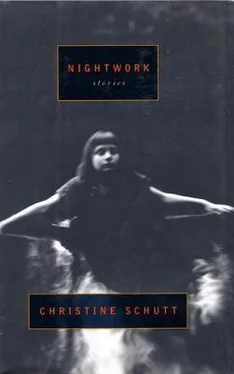I have done my share of kissing — so what am I afraid of? The teeth, their leafy transparency? His teeth remind me of my grandfather’s teeth, and the shock, up close, of all that metal inside his mouth.
I never talk to the old man about my grandfather. My past reads earnest as a yearbook; I mostly keep it to myself. We have an understanding, the old man and I — he keeps the talk since the last wife’s death. Always, he pays for dinner.
I like watching him take out his wallet. He seems very shrewd to me when he takes out his wallet — on his own, no need of me. I can get excited; I admit it. He looks good to me then. His brick red neck, his grizzle — a kind of overgrown look he has — hair in the ears and growing over even the knuckles, I am attracted to this about him, and especially to his knuckles, his hands. His hands are brown and easeful; I want to touch them. So why is it, when he touches me, I flinch?
I worry when the meal is over.
I worry about the walk home.
What does he expect?
His face blurs and tires; there is no sign of wanting, none that I can read. Used to be the body knew; the body made the decisions. I could smell it, all that want, and I knew what to do. The awkwardnesses — putting on a coat, taking up my purse — were only felt as tweaks on the way to the next event. The point was to leave — never as it is now: to wait, to consider. The point was move fast, get home, get anywhere.
Outdoors, indoors, rooms — all rooms — once even on a porch to a house I was helping christen: It happened anywhere, sometimes even with restrictions, insurmountable now, so drunk or dopey, the room turned to fuzz. I had sex when I was tripping, when I was sick with the flu, and often in the middle of my bleeding with so much coming out of me, I should have been embarrassed, not as I was, indifferent to precautions and towels, staining the bed, me, him, seeing his mouth red, but I cannot see this old man’s mouth ever being red.
His age bleaches even his past.
I cannot see this man’s mouth at all.
He has pinched up his muffler. We are walking against the wind around the building where I live. The building is dark; even the doorman is absent. No one is waiting up for me.
We woke in the parked car aslant in the field Cory’s grandma had found for us to sleep in, turned earth in front of us, almost houses behind, frames and unpoured sidewalks, abandoned machines and wheelbarrows left anywhere in the thin light that was the afternoon light we knew for spring in the county. We had lived through these long, wrong seasons before; we knew this cold, how even the fruit trees went on pouting, unwilling as girls to unfurl their crimped leaves, show their blossoms. Too cold to have even unrolled the windows before we fell asleep — on the instant — the car driving itself over the ridged site and tender, penned-off, seeded yards to settle safely at an angle on higher ground.
Here it was, awake again, we hushed the unmade house that we had left behind, the sorrowful impressions of bodies in beds, blankets, curtains, clothes bunched and flung away, my sister’s crying when what was there worth crying about?
“Did you want to go on peeing in a pan in the basement,” we asked my sister, “no running water?” Food greasing the goosenecked paper bags the women gave us for the afternoon when they remembered there would be an afternoon with us children left to draw in the common room; nothing but gobby pens and squared-off pencils sharpened by a knife to make our names with — we used erasers. We could blow off what we wrote: our names and our mothers’ names and where we had come from or been to, which was no place you would want to be once you had learned how to spell it.
But the stuttering boy, he couldn’t even say where it was he had been to. Lemon-water yellow color of someone sickly, he slunk about the compound, brushing his hand across his brush-cut hair, worrying his father’s dying in that tuh-town he couldn’t say — his mother in the bleeding room with our mothers, keeping clean.
“Do you remember at all?” we asked my sister, who did not answer and might still have been sleeping when we were in the front seat saying, “Yes, it was a good thing we had left our mothers — who knew what they were doing?”
Kneading his feet with their spatulate thumbs, salving the raised skin of wounds.
“How he suffers!” they said, walking among us with his terrible vision when the grasses shudder on an intake of breath and cattle list, and all things roosting or rooting lift off, move away, flame on flame taking up the field and us — but not by name. This man named Jerry, he was not always sure of our names. Jerry called us after others, or else it was we were the children, although I was no child. I had been to the bleeding room. I knew what the mothers inside were doing, washing one another and applying hot waxes. Three, four, five days shut off, standing in the steam of the herbal boil, we came out clean and nearly hairless, our knuckles pinked from scrubbing rags with stones.
The compound was so primitive. There was a spigot in the greenhouse where the shot-out panes were taped with plastic, moaning in the wind. We made the stuttering boy or the older Ruth go there to the greenhouse—“Although it could have been you,” we told my sister. “Would you have liked that, the florist spikes and prickly markers at your feet, talking to the spigot, saying. Hurry, please, hurry?”
We did not like to be alone on the compound, but we were often alone on the compound with the babies in sodden diapers, licking dirt. My sister found a dead rat and thought it was a kitten and came carrying it back to us in tears. We beat the dead rat with a shovel. We beat Naomi, too. We each took a whack at that stalk of a girl, running in the heat in just her underpants. The oppressive summers in this county — you need some way to stay cool.
“Don’t you want air conditioning?” we asked the baby, my sister. “Don’t you like the comforts in this car?”
“I miss Mother,” was what my sister said. “I want to go back.”
But we told Cory’s grandma, “Don’t pay attention to her. She doesn’t know what she is saying. Drive on, please,” which she did, with Cory wheezing again in the front seat, and Cory’s grandma asking, “Where’s that thing you suck on, Coreen? Was there no one in that place to think of you?”
No one, no one, we assured her, with the mothers stapling pamphlets and driving to the mall. They looked like messy girls to us, and I was surprised at my mother. She let her hair grow lank and her wide-slung self swing free. She jostled underneath her clothes when she walked, hoisting herself into the cab of the truck, never turning, as some others turned, to wave good-bye.
“Is that your idea of loving?” I asked the sniveler, the baby, my sister.
The mission was stu-stupid was what the stuttering boy always said, worrying his real father was already dead in his bed up north where the stuttering boy had seen him. The stuttering boy had said his good-byes before his mother put herself and him in that same truck as ours, had boarded and ridden to the compound, ridden to the mall, ridden to the old towns strung with bunting on the holidays.
Our mothers, butting tambourines and crying out, “Amen!” and crying sometimes — oh, we were embarrassed!
“Weren’t you embarrassed?” we asked my sister, which was a feeling she didn’t understand, I think, wearing her mopey face, saying, “I liked dancing with Mother. We put cracks in the ceiling from our dancing. Mother showed me the damage,” my sister said, and she was crying again, but we weren’t embarrassed this time — only angry.
Читать дальше












